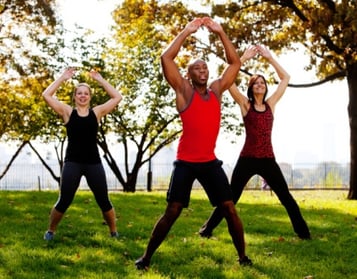 I recently ended my rugby career at Indiana University. I had been playing for 9 years, and competed in various other sports before that. Until now, I have always had a coach scheduling practices and creating workouts for me, and have always pushed myself to my limits for the team.
I recently ended my rugby career at Indiana University. I had been playing for 9 years, and competed in various other sports before that. Until now, I have always had a coach scheduling practices and creating workouts for me, and have always pushed myself to my limits for the team.
If you've played sports your whole life but now you are in the real world with other responsibilities and time constraints that did not exist when you were an athlete, you may start to lose your strength and endurance. You may have even noticed changes in your body due to your lifestyle change. You want to stay in shape or get back in shape, but you are unsure where to start or what to do.
Here are a few tips to help you figure out how to train as a former athlete.
- Acknowledge that you are no longer a competitive athlete. You are now a former athlete. This is a hard step to take because in your heart you will always be an athlete. You are just no longer a part of a team or competition, and that is okay.
- Create new goals for yourself that pertain to your life now. Back in college or high school, you trained a lot, and you trained hard. You had a deadline to be in shape before your first game. However, this mindset may not work now with your new lifestyle. You need to set new goals, which can include cardiovascular training like running or biking. Or your goal could be to lose weight or fat. Your goal can even simply be to maintain a certain overall fitness level.
- Train better, not harder. During athletic training you were told to run more, lift more, and practice more in order to be the best and win. This mindset and form of training may have worked then, but that doesn't necessarily mean it works now. You need to train better and more efficiently. Training better is easier to maintain and accomplish than trying to train as hard as you did before. But how do you know you are training better, when all you have known is how to train hard?
Many gyms offer training programs for marathons or triathlons or even weight loss. What is great about these programs is that they have coaches that create workouts and guide you through them. You will work alongside others in the program and can get the feeling of being part of a team. Here at NIFS we offer a variety of training programs.
Find a Personal Trainer
If you are interested in working on your own, but still feel that you need more guidance, look into personal training. Trainers offer you the accountability that coaches and practices did. Personal trainers can help create new goals for you and lead you through specific, efficient programs.
Working Out on Your Own
If you need help finding a starting point, here are some tips and examples you can use to help. You'll want to focus on full-body, multi-joint lifts.
Here are examples of some exercises you can use as the basis of your workouts:
- Squats
- Lunges
- Deadlifts
- Rows
- Pull-ups
- Pushups
Choose a few to perform for each workout. You can alternate between 2 and 3 days per week, performing 3 to 4 sets of 8 to 12 repetitions each.
When performing cardio, a great goal is to try to complete at least 150 minutes of moderate-to-vigorous exercise each week. For example, you can complete five 30-minute sessions of cardio each week. You can also perform them on the same day as your strength training.
***
In the end, take time to find what works best for you at this time in your life. Training like you did when you were an athlete isn't always what works. Explore your options, and find what you like to do now.
This blog was written by Masie Duncan, Health Fitness Instructor and Weight Loss Coordinator. To find out more about the NIFS bloggers, click here.




 A recent
A recent  In
In  The concept of defining fitness seems simple at first glance, but like Jell-O®, the definition of fitness appears solid on the surface until you grab at it and realize that impression was wrong. Both will get messy while they ooze in all directions.
The concept of defining fitness seems simple at first glance, but like Jell-O®, the definition of fitness appears solid on the surface until you grab at it and realize that impression was wrong. Both will get messy while they ooze in all directions. If you are anything like me, the new year comes with lots of “I’m going to do this (fill in the blank) better than I did last year,” or “I am starting a new workout plan for the year,” or maybe “My goal this year is to ________.” Then mid-February hits and all those New Year’s habits you planned to start, goals you were working toward, or things you were going to do better on have fallen off the radar.
If you are anything like me, the new year comes with lots of “I’m going to do this (fill in the blank) better than I did last year,” or “I am starting a new workout plan for the year,” or maybe “My goal this year is to ________.” Then mid-February hits and all those New Year’s habits you planned to start, goals you were working toward, or things you were going to do better on have fallen off the radar. Have you ever considered what working with a personal trainer could do for you? Among many things, working with a personal trainer can help you to reach your goals, stay motivated, and provide you with accountability. Whether you are looking to lose weight, improve fitness, or use exercise as a way to improve your lifestyle, a personal trainer can be a great resource on your journey. We at NIFS believe that we house some of the best
Have you ever considered what working with a personal trainer could do for you? Among many things, working with a personal trainer can help you to reach your goals, stay motivated, and provide you with accountability. Whether you are looking to lose weight, improve fitness, or use exercise as a way to improve your lifestyle, a personal trainer can be a great resource on your journey. We at NIFS believe that we house some of the best 

 Over the past several weeks we have had some ups and downs with teammates being sick and/or injured but no one has given up!
Over the past several weeks we have had some ups and downs with teammates being sick and/or injured but no one has given up!

